
Riodinidae is the family of metalmark butterflies. The common name "metalmarks" refers to the small, metallic-looking spots commonly found on their wings. The 1532 species are placed in 146 genera. Although mostly Neotropical in distribution, the family is also represented both in the Nearctic, Palearctic, Australasian (Dicallaneura), Afrotropic, and Indomalayan realms.

Apodemia is a New World genus of metalmark butterflies found from Canada to Brazil.

Riodininae is the largest of the three subfamilies within the metalmark butterfly family, Riodinidae.

Erythrostemon mexicanus, formerly Caesalpinia mexicana, is a species of plant in the genus Erythrostemon, within the pea family, Fabaceae. Common names include Mexican holdback, Mexican caesalpinia, and tabachín del monte. It is native to the extreme lower Rio Grande Valley of Texas and to parts of Mexico: in the northeast and further south along the Gulf coast as well as the Pacific coast in Nayarit, Jalisco, Colima, and a small portion of Sinaloa.
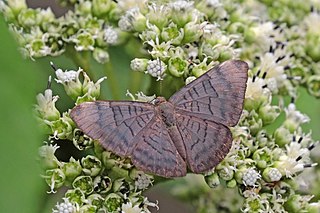
Emesis lucinda is a butterfly of the family Riodinidae. It is found from Mexico to Bolivia and in Suriname, French Guiana and Brazil.

Calephelis perditalis, the rounded metalmark or lost metalmark, is a butterfly in the family Riodinidae. It is found in Texas in the United States and Mexico, south to Venezuela. The species was first described by William Barnes and James Halliday McDunnough in 1918.
Apodemia walkeri, or Walker's metalmark, is a butterfly in the family Riodinidae (metalmarks), in the superfamily Papilionoidea. The species was described by Frederick DuCane Godman and Osbert Salvin in 1886. It is found from north-western Costa Rica north through Mexico. It is an occasional visitor to the lower Rio Grande Valley in southern Texas. The habitat consists of subtropical scrubs and forests.

Emesiini is a tribe of metalmark butterflies in the family Riodinidae. There are at least 2 genera and about 15 described species in Emesiini.

Calephelis wrighti, or Wright's metalmark, is a species of metalmark in the butterfly family Riodinidae. It is found in North America.
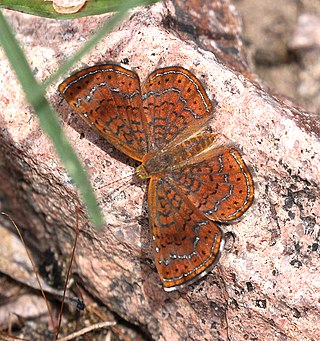
Calephelis arizonensis, the Arizona metalmark, is a species of metalmark in the butterfly family Riodinidae. It is found in North America.
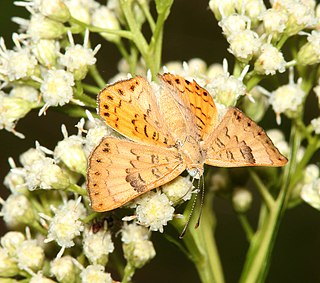
Apodemia zela, the zela metalmark, is a species of metalmark in the butterfly family Riodinidae. It is found in North America.
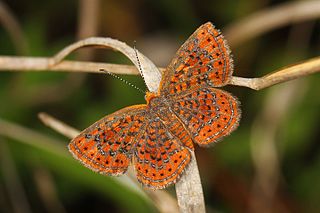
Calephelis virginiensis, the little metalmark, is a species of metalmark in the butterfly family Riodinidae. It is found in North America.

Apodemia hepburni, or Hepburn's metalmark, is a species of metalmark in the family of butterflies known as Riodinidae. It is found in North America.
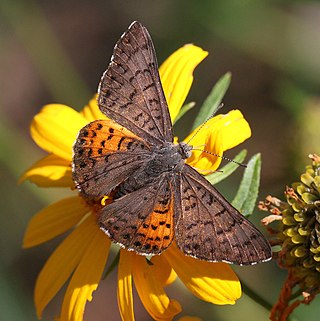
Apodemia ares, the ares metalmark, is a species of metalmark in the butterfly family Riodinidae. It is found in North America.

Apodemia nais, the nais metalmark, is a species of metalmark in the family of butterflies known as Riodinidae. It is found in North America.
Apodemia duryi, known generally as the Organ Mountain metalmark or Mexican metalmark, is a species of metalmark in the butterfly family Riodinidae.
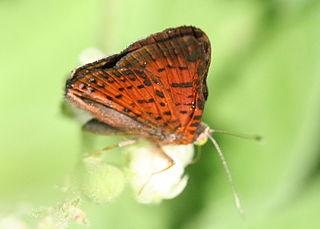
Caria ino, the red-bordered metalmark, is a species of metalmark in the butterfly family Riodinidae. It is found in North America.

Emesis tenedia, the falcate metalmark, is a species of metalmark in the butterfly family Riodinidae. It is found in North America.
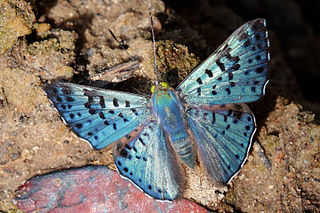
Lasaia is a genus of metalmark butterflies in the family Riodinidae. The genus was erected by Henry Walter Bates in 1868. There are about 13 described species in Lasaia, found in North, Central, and South America.

Nemeobiinae is a subfamily of Riodinidae, the metalmark family. The subfamily's members consist entirely of Old World members of the Riodinid family. Recent revisions to the subfamily have begun to include members located within the New World as well, however, the subfamily continues to encompass the entirety of the Old World Riodinids.


















